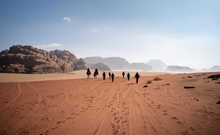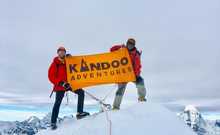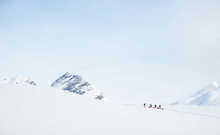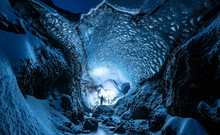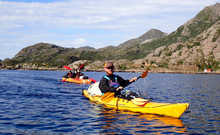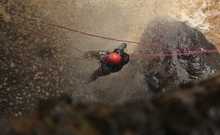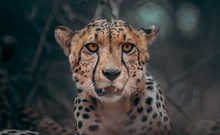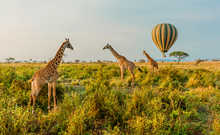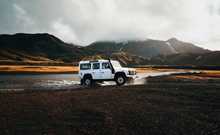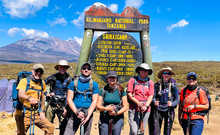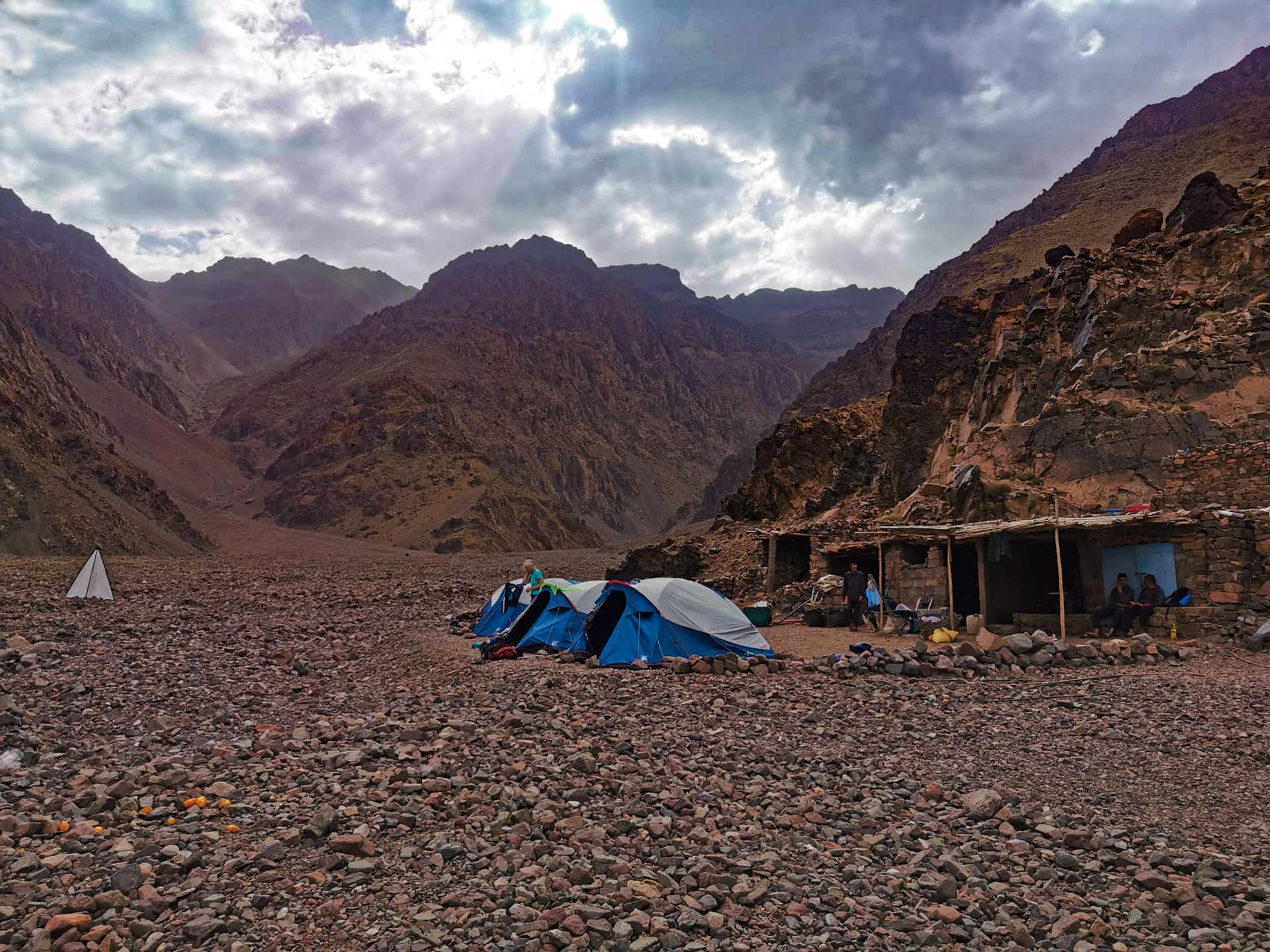At Kandoo, we love the variety of treasures that can be found in Morocco; from the golden crested waves of the desert dunes to the snow capped peaks of the High Atlas. Morocco is home to many a phenomenon including North Africa's tallest mountain. Toubkal is a gentle giant that feels accessible to most and yet provides enough challenge to give a huge sense of achievement once conquered. Although Africa isn't necessarily the first continent that springs to mind when it comes to winter trips, Toubkal also provides a great first ascent for those just starting out in their winter mountaineering careers. Journeying further inland, if desert heat is more your idea of a good time, then step into another world as the High Atlas gives way to the Ergs of the Sahara. Rolling dunes smattered across barren shrubbery to the steady plod of camels. This slower pace of life allows a gentler approach to Moroccan culture.
You will need to arrive in Marrakesh on day 1 of your itinerary and the trek will begin the following morning. For UK travellers, there are direct flights with BA, Easy Jet and Ryan Air from Heathrow, Gatwick, Luton, Stansted and Manchester. With a short stop in Europe, you can travel from virtually any major UK airport. The flight time from the UK is roughly four hours.
There are no direct flights to Marrakesh from the USA but, it is only necessary to have a short stop of less than 3 and a half hours somewhere in Europe. Delta Airways operate convenient flights via Paris from New York, Boston and Los Angles. TAP Air Portugal, American Airlines and United provide further options.
Menara Airport is located 9km outside the city of Marrakesh and the transfer to your hotel will take between 20 and 30 mins. We provide personalised transfers so somebody will be at the airport to meet you when your flight gets in. Please be aware that if your flight arrives within 90 minutes of another guest you may be asked to wait until they have arrived to share a transfer. Rest assured, you won't be asked to wait for more than 90 minutes.
Once you have cleared immigration and collected your luggage please exit the doors to the arrivals area and look out for a Kandoo team member holding a big sign reading "KANDOO". Once you have exited arrivals you will not be allowed back in, so please ensure you have exchanged your money and any other necessary errands before leaving the airport.
Please bear in mind that meals in Marrakesh are not included in your tour. This means if you arrive on a very late flight you may struggle to find somewhere to eat by the time you have reached the hotel. We recommend booking a flight that arrives in Marrakesh no later than 5:30pm, allowing you to reach the hotel with plenty of time to have a relaxed meal before bed.
Due to local regulations at Marrakesh, mobile boarding passes are not valid for your return flight. You will need to print your boarding pass and go to the check-in desk to get your documents checked, even if you don't have bags to drop off
If you are changing airlines or re-checking your luggage at an airport on route, please ensure you leave a minimum of 3 hours between flights. This will account for any delays on arrival, travel time across airports (this can take longer than you think) and time taken to re-check baggage.
Marrakesh
Where to eat in Marrakesh?
In Marrakesh you will be staying in a comfortable 4 star hotel in an en-suite twin or double room. WiFi is available at the hotel and it also has a swimming pool, hammam (spa) and restaurant. You can purchase meals at the hotel or head out in to the city to find a restaurant.
Less than a 5 minute walk from the hotel you will find Bd Moulay Rachid, a street with a wide range
of international and local options and you will find most dietary requirements
are catered for. Restaurants with international options such as pizza and burgers, French and local cuisine, or if you are wanting something lighter then look for the roadside cafes offering the locals favourite, Omelette Khaali (lamb omelette) and Mint Tea.
The other option is to head further into Marrakesh into the Medina (Old Town), where restaurants line the main square and if you look up many have rooftop terraces which offer a welcome breeze in the city heat.
Travelling around Marrakesh
Our hotel is situated in the Gueliz area of Marrakesh. From here it is roughly a 40 minute walk to the Medina - head out of the hotel doors and turn right, then right again at the first road junction. Take this road until it meets the main dual carriageway and following the road as it takes a slight right, continue along it until it crosses the Old Town walls. Look out for signposts to the Jamaa El F'na, this is where you are heading.
Alternatively if a 40 minute walk is not what you want in the heat of the day, then make your way to Carré Eden where the Number 1 bus will take you to Jamaa El F'na for 4MAD (~35p). This can also be done, at the same price, for the return journey.
The final option for travel is to take one of the many beige cabs or a horse drawn carriage from the Medina. These are readily available and can be organised by the hotel upon request, usually costing around 30-40MAD for a journey (~£3).
Places to visit in Marrakesh
The main cultural highlights in the city are the renovated gardens and palaces situated around the Medina:
Bahia Palace (80MAD entry) - Built between 1866 and 1867 by Si Moussa, the Bahia palace features 150 rooms and once housed the Resident General during the French Protectorate era. Set within the Medina, the Bahia Palace is a beautiful historical museum open to the public daily.
Jardin Majorelle (150MAD entry) - Owned by Yves Saint Laurent, these gardens are renowned for being the most beautiful in Morocco.
Jamaa El F'naa (free) - This is the main market square in the Medina and is a bustling mecca for chaotic bartering.
Ben Youssef Madrasa (40MAD entry) - Built almost 500 years ago, the Ben Youssef Madrasa was once the largest Islamic school in North Africa and had up to 900 students at its peak. The madrasa was still in use for teaching up until 1960 and clearly very little has been altered or developed since construction was finished in 1565.
Trekking in Morocco
Morocco's adventurous spirit in enclosed in it's rugged centre; whether this be the simmering dunes of the Sahara or the rocky outcrops of the High Atlas. Here we have outlined our Morocco trekking trips:
CLIMB MOUNT TOUBKAL | Summit North Africa's tallest mountain! Take a less trodden, scenic approach that arrives at the mountain from the east. Crossing several high passes along the way gives us time to acclimatise and experience more of the stunning High Atlas range. On route we meet the local nomadic Berber people, shepherding their livestock though the incredible scenery.
CLIMB MOUNT TOUBKAL IN WINTER | On this adventure we will climb Ouanoukrim (4088m), the second highest peak in Morocco and Toubkal (4167m) the highest peak in north Africa. You will be accompanied by expert mountain guides every step of the way and all your technical gear is provided.
TREK TO THE SAHARA DESERT | A true Bedouin experience. Heading south from Form Zguid and traversing the beautiful arch of Jbel Bani, that provides the backdrop for our trek, we step into another world. Marvelling at the sunlight, casting mystical shadows over Erg Rhoul, Erg Lâalem, Erg Lâabidlya and Chintouf, we savour our time, swaying between a steady plod and siestas under the cool shade of canopy.
When to trek
You can find detailed advice on when to trek in our Morocco Travel Guide.
This a brief summary. Weather should be the first thing you think about when you decide when to trek. Morocco can be extremely hot in the summer with temperatures reaching into the mid-late 40s at times in Marrakesh. As the elevation increases in the High Atlas however, temperatures quickly drop and can sit in the comfortable mid 20s during the day, dropping to between 5-10 degrees at night. In the winter, the temperatures can reach the other extreme and be very, very low, particularly at night. We cater our trips to the times best suited temperature wise. Our High Atlas trips can run all through the summer as the heat of Marrakesh doesn't stretch to the high mountains, our desert treks run in the late autumn and early spring when the heat of summer is no longer an issue and our winter trips run, yep you guessed it, through the winter months to ensure the snow pack is solid.
So, whatever the time of year, there is a trip available in Morocco.
Training for your trek in Morocco
The trekking in Morocco ranges from relatively gentle dunes to arduous snow slopes. Trek to the Sahara Desert is doable by anyone with some trekking experience and a good mindset, whereas climbing Toubkal in Winter requires a little more expertise and fitness. What makes trekking in Morocco extra challenging is the temperature fluctuations - you will be exposed to high temperatures whilst in Marrakesh and the desert, however you may also experience a morning dew and a chilly night up in the High Atlas, even in summer. Our Climb Toubkal route follows an average of 1000m of elevation per day, which can be taxing if you are not used to taking on this level of ascent on consecutive days. You will also reach altitude where the lessening of oxygen will begin to have effects on the body, the most obvious being breathlessness.
In order to avoid getting altitude sickness we adopt a slow, steady pace and cover a number of passes prior to our summit ascent to spend time acclimatising. This sometimes results in fairly big days prior to summit day and can be tiring if no training has been done prior to the trip. In terms of distance walked and the altitude climbed, a day's trekking in the High Atlas will be no more difficult than a typical day's hiking at home, however doing this for 6+ days consecutively can combine to make the trek a tough challenge. See our training guide for tips on how to prepare yourself for your arrival in Morocco.
Camping and other accommodation in Morocco
Camping
We provide a good quality 3 man tent. They are designed to sleep three people, but we only ever sleep 2 to a
tent, to ensure you have plenty of space for you and your gear. Keep in mind,
these are proper mountain tents, designed to cope with extreme conditions so
don’t expect to be able to stand up and walk around inside! A foam mattress per person will also be provided. You will be required to assist with pitching your own tent at the end of each day.
Your meals will be taken in a separate mess tent where you will be able to sit comfortably, while you relax and chat to your team mates and enjoy some of the delicious food that our cook has freshly prepared for you. Inside, you’ll be pleased to find a table (of course) and fold out stools so there is no need to sit on the floor! A toilet tent will also be set up to allow some privacy.
Other Accommodation
In Marrakesh and in Ouarzazate, you will be staying in comfortable 4 star hotels in an en-suite twin or double
room. The hotel in Marrakesh has a swimming pool, hammam (spa), restaurant and free WiFi.
When staying in the Nelter Refuge (Winter Toubkal only) we will stay in dormitories with shared bathroom facilities. There is a communal lounge with an open fireplace at the refuge and we will be able to use the washroom facilities, shop and WiFi. The washrooms have western toilets and hot showers (available for 10MAD for an unlimited time).
The guesthouse in Aremd will be in the style of a local Moroccan house with a kitchen, living area, twin/triple or double rooms and a shared bathroom with a western toilet and hot shower. It has a double staged roof terrace with views up to Toubkal. WiFi is also available here.
The hotels in Morocco all have western, flushing toilets. Whilst on the trek the toilet situation will be a little less luxurious. At camp each evening we will set up a toilet
tent. This is a very basic facility that provides a little privacy. The toilet tent will simply cover a hole
in the ground. If you don't wish to use the toilet tent there is always the option to find somewhere hidden, away from camp or the path and go wild. We can guarantee it will be the most scenic toilet break you've ever had! Please remember to bring toilet roll and a lighter to burn it after use.
During your trek you will be accompanied
by a cook who will prepare all of your meals.
At breakfast there is tea, coffee and hot chocolate, bread, jam, cheese, Nutella and sometimes a local speciality. A typical lunch will be a
salad with fresh vegetables, corn, boiled eggs, tuna and rice or pasta served alongside a traditional curried dish, such as dahl or a tagine.
Evening meals will always be made up of delicious Moroccan cuisine prepared with locally sourced ingredients. There will normally be a soup starter
followed by a tagine or stew with salad, couscous or pasta and bread. We can provide vegetarian, vegan or gluten
free meals on request. If you have
special dietary requirements please let us know when booking your trip.
In Marrakesh, at the start and end of
your trip, you can purchase meals at the hotel or head out in to the city to
find a restaurant. Less than a 5 minute walk from the hotel you will find Bd Moulay Rachid, a street with a wide range
of international and local options and you will find most dietary requirements
are catered for. Restaurants with international options such as pizza and burgers, French and local cuisine, or if you are wanting something lighter then look for the roadside cafes offering the locals favourite, Omelette Khaali (lamb omelette) and Mint Tea.
Drinks are not included in the cost of
your trip (unless on the desert trek where mineral water is provided whilst trekking). You will need to bring a
water purification filter or tablets and at least two water bottles or flasks. During your trek you can refill your water at
natural springs, in villages and at the refuge below Toubkal. On some days you may not pass a shop as the treks go through remote valleys and many of the shops are in small villages or settlements and therefore may close without warning. Please ensure you are able to purify natural water safely, rather than relying on buying bottled water; we also do not recommend acquiring single-use, plastic water
bottles as these must be carried out and recycled.
The local currency is the Moroccan Dirham (MAD). For the most up to date exchange rate please visit www.xe.com.
The dirham is a closed currency, which means it can only be bought once you arrive in Morocco. You’re allowed to bring in or take out 1000Dh (around £65) but you’ll need to exchange the rest on arrival. You can get good exchange rates at the airport with cash and credit card exchange available alongside baggage reclaim and debit/travel card exchange available in the arrivals buildings after you have cleared customs. You can also exchange your GBP (don’t bring Scottish, Gibraltar or Northern Irish Sterling notes) or US Dollars to Dirhams at a bank and in most hotels. Keep hold of your receipt to convert your Dirhams back when you leave – you can do this at the airport for a good rate.
A meal out for 2 people in Morocco will cost ~$15. You will need to account for two evening meals in Marrakesh plus money for any lunches whilst in Marrakesh, tips, drinks and souvenirs. Gifts and souvenirs are best acquired from the markets in the Medina. Prepare to get haggling! Our recommended guidance for spending budget in Morocco would be between $50-100 on top of your tips, give you ample souvenir spending money.
Tipping is common in Morocco but not mandatory and should be based on the level of service you feel you have received. The below amounts will give you a rough idea of how much you should tip (per trekker per week). Please tip in Moroccan Dirham rather than in your home currency where possible.
Guide: 100-160 MAD ($10-15)
Cook: 85-110 MAD ($8-10)
Mule drivers: 160-210 MAD ($15-20) - amount per driver (depending on your group size you may have between 3-5 mules and drivers)
Different crew members
will be with you for different stages of your trip to Morocco:
- Your guide will be with
you every day that you are in Morocco.
- Your cook and mule drivers will be with you while you are on the trek itself (you may have up to 5 mule drivers on your trek, depending on the number of participants. You will be provided with this information 3 weeks before departure)
- A driver will provide
your airport transfers and transfer you to
and from the trek.
Other things to do in Morocco
Trekking isn't the only activity that will get your blood pumping in Morocco. It plays host to a wide range of other outdoor activities; scale to teetering heights and go climbing in the Todra Gorge, fly over the dunes on quadbikes or hop in a raft or kayak and bounce down the white water rapids of Morocco's grand canyon - The Ahansal River.
Or if you prefer a more sedate approach, then Morocco is famous for it's Hot Air Balloon rides. Cruise over the expanses of colourful desert suspended amidst the cloudless skies in a woven basket. Then take a camel ride through the dunes before heading out to the coast for some culture and relaxation in Essouira, Casablanca or Agadir.
If you are visiting the desert in April then keep an eye out for the Marathon des Sables, a torturous 6-day marathon across the Saharan dunes. In the summer months, look out for the Marrakesh popular arts festival: Dancers, fire breathers, snake charmers, musicians and performers of every kind arrive in Marrakesh for this event. Most performances take place in Jamma el F'na and are a spectacular celebration of flamboyant colour.
